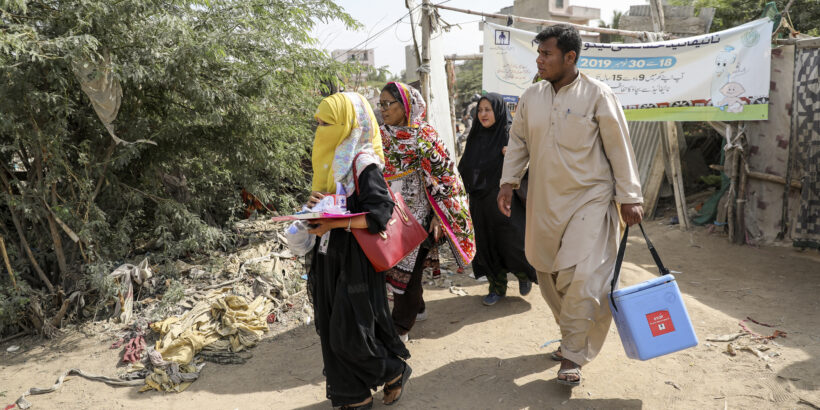Drug-resistant typhoid is a major public health challenge in Pakistan, where an estimated 25 percent of cases are extensively drug-resistant (XDR). In Pakistan’s Sindh and Punjab provinces, 65% and 44% of blood culture-confirmed typhoid cases are XDR, respectively.
XDR Salmonella Typhi (S. Typhi) organisms are resistant to five different classes of antimicrobials, leaving only two effective licensed treatment options. Resistance to these two treatment options has also been reported in Pakistan. Without effective antimicrobials, typhoid may become untreatable—increasing the urgency for preventative measures such as typhoid conjugate vaccines (TCVs).
In 2019, Pakistan became the first country to introduce TCVs into its national immunization program, taking a major step to prevent typhoid fever, including XDR typhoid. TCVs have been shown to be highly efficacious against XDR typhoid in Pakistan, reinforcing that TCVs are an important tool to prevent drug resistance.
Investigating the impact of TCVs on drug resistance
Overuse of antimicrobials is a substantial contributor to the rise of drug-resistant bacteria. Global antimicrobial consumption increased by nearly 50 percent from 2000 to 2018, particularly in South Asian countries like Pakistan. TCVs have potential to reduce drug resistance, both by preventing infections caused by drug-resistant typhoid bacteria and by reducing antimicrobial use. Our study seeks to add to the evidence base by investigating the impact of large-scale TCV introduction on antimicrobial use in Karachi.
The study leverages data from the Impact assessment of Typhoid conjugate vaccine following introduction in Routine Immunisation (ITRIPP) project—which supports blood culture surveillance for febrile illness to evaluate post-introduction TCV effectiveness—as well as funding support from Bactivac. We will analyze the effectiveness of a single dose of TCV against both overall and typhoid-specific antimicrobial use, with a focus on usage of carbapenems—a class of broad-spectrum antimicrobials that are often used as “last-line” agents when other antimicrobials have failed. Carbapenems are used in Pakistan to treat XDR typhoid cases in inpatient settings.
TCVs’ potential to reduce antimicrobial use
Preliminary data from randomized controlled trials conducted by the TyVAC Consortium suggest that a single dose of TCV shows efficacy in preventing prescriptions of antimicrobials specifically used to treat typhoid. Carbapenems, along with the oral antimicrobial azithromycin, are one of the only remaining effective treatments for XDR typhoid. Carbapenems must be administered intravenously, imposing a significant burden on patients and health systems in low-resource settings with increased treatment costs. A decrease in carbapenem use would suggest that TCV may not only be preventing XDR typhoid infections, but freeing up hospital capacity, reducing time and financial costs for typhoid patients, and preserving these last-line treatments.
TCVs not only provide safe, effective protection against typhoid, but are also an important shield against increasing drug resistance in typhoid-endemic regions. This study provides the first opportunity to assess the impact of national TCV introduction on antimicrobial use, which can provide a better understanding of the full public health value of these lifesaving interventions. Preliminary findings from the TyVAC studies emphasize the need to increase TCV coverage in countries that have introduced and for more TCV introductions in typhoid-endemic settings, particularly where drug resistance is prevalent, to prevent further emergence and spread of drug-resistant S. Typhi.
Efforts to prevent infections caused by drug-resistant typhoid strains are part of the larger movement against all drug resistance globally. Further research on TCVs’ effects on reducing drug resistance and bacterial population dynamics are critical to inform global policy and optimize management strategies.
1. Department of Infection Biology, Faculty of Infectious and Tropical Diseases, London School of Hygiene and Tropical Medicine, London, United Kingdom.
2. IAVI, Chelsea & Westminster Hospital, London, United Kingdom.
3. Department of Pediatrics and Child Health, Aga Khan University Hospital, Karachi, Pakistan.
4. Malawi Liverpool Wellcome Programme, Blantyre, Malawi.
5. Institute of Infection, Veterinary and Ecological Sciences, University of Liverpool, Liverpool, UK.
Cover photo: Immunization campaign workers carry containers of typhoid conjugate vaccines during an immunization campaign in Pakistan. Credit: TyVAC/Asad Zaidi



